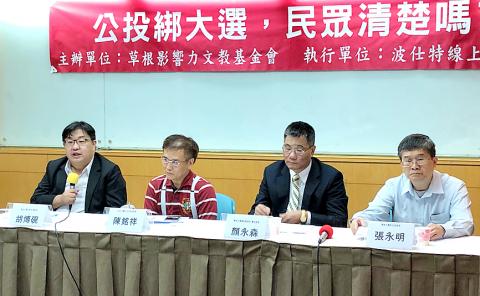About 65 percent of respondents said they would participate in at least one of the 10 referendums to run alongside the nine-in-one elections on Nov. 24, a survey released by the non-profit Grassroots Influence Foundation showed yesterday.
While 90 percent of respondents said they knew referendums were to be held alongside the local elections, 38 percent said they did not have a clear idea of the rules about receiving referendum ballot papers at polling stations, while 32 percent said they were unaware that there are two stages to voting: choosing candidates in the local elections and voting in the referendums, the poll showed.
Of those polled, 48.3 percent said they did not know what issues are covered by the referendums, while 71.5 percent said that the government had not promoted them well enough.

Photo: CNA
Amendments to the Referendum Act (公民投票法) in December last year lowered thresholds, making referendums significantly easier to initiate and bringing an unprecedented number to this month’s vote.
The amendments lowered the voting age for referendums from 20 to 18, the turnout quorum from 50 percent to 25 percent, as well as the first and second-stage thresholds from 0.005 percent and 5 percent of the electorate in the most recent presidential election to 0.0001 percent and 1.5 percent respectively.
Five of the referendums are related to same-sex marriage and LGBT-inclusive education. Other topics are air pollution, the use of nuclear energy, the construction of coal-powered plants, the name of the national team at the 2020 Tokyo Olympics, and a ban on food imports from Japan’s Fukushima Prefecture and other areas following the 2011 Fukushima Dai-ichi nuclear disaster.
Attorney Yu Min-chieh (游敏傑) said that as the act stipulates that a referendum will be deemed legitimate if 25 percent of eligible voters vote “yes,” there is the likelihood of two conflicting referendums both passing.
“The government should amend the act to allow only one referendum to prevail if such a situation arises, either by comparing the exact number of yes votes they receive or holding a second round of voting,” Yu said.
Tamkang University Department of Public Administration professor Chen Ming-siang (陳銘祥) said that the decision to print the 10 referendums on 10 separate ballot papers, instead of all on one paper, was an invitation for chaos and mistakes on polling day.
National University of Kaohsiung Department of Economic and Financial Law professor Chang Yeong-ming (張永明) said the Central Election Commission should should clearly mark a route on the floor of polling stations to direct people to avoid situations where voters accidentally leave after only voting in the local elections.
The poll collected responses online from 1,100 eligible voters.

Chinese Nationalist Party (KMT) Chairman Eric Chu (朱立倫), spokeswoman Yang Chih-yu (楊智伃) and Legislator Hsieh Lung-chieh (謝龍介) would be summoned by police for questioning for leading an illegal assembly on Thursday evening last week, Minister of the Interior Liu Shyh-fang (劉世芳) said today. The three KMT officials led an assembly outside the Taipei City Prosecutors’ Office, a restricted area where public assembly is not allowed, protesting the questioning of several KMT staff and searches of KMT headquarters and offices in a recall petition forgery case. Chu, Yang and Hsieh are all suspected of contravening the Assembly and Parade Act (集會遊行法) by holding

PRAISE: Japanese visitor Takashi Kubota said the Taiwanese temple architecture images showcased in the AI Art Gallery were the most impressive displays he saw Taiwan does not have an official pavilion at the World Expo in Osaka, Japan, because of its diplomatic predicament, but the government-backed Tech World pavilion is drawing interest with its unique recreations of works by Taiwanese artists. The pavilion features an artificial intelligence (AI)-based art gallery showcasing works of famous Taiwanese artists from the Japanese colonial period using innovative technologies. Among its main simulated displays are Eastern gouache paintings by Chen Chin (陳進), Lin Yu-shan (林玉山) and Kuo Hsueh-hu (郭雪湖), who were the three young Taiwanese painters selected for the East Asian Painting exhibition in 1927. Gouache is a water-based

Taiwan would welcome the return of Honduras as a diplomatic ally if its next president decides to make such a move, Minister of Foreign Affairs Lin Chia-lung (林佳龍) said yesterday. “Of course, we would welcome Honduras if they want to restore diplomatic ties with Taiwan after their elections,” Lin said at a meeting of the legislature’s Foreign Affairs and National Defense Committee, when asked to comment on statements made by two of the three Honduran presidential candidates during the presidential campaign in the Central American country. Taiwan is paying close attention to the region as a whole in the wake of a

OFF-TARGET: More than 30,000 participants were expected to take part in the Games next month, but only 6,550 foreign and 19,400 Taiwanese athletes have registered Taipei city councilors yesterday blasted the organizers of next month’s World Masters Games over sudden timetable and venue changes, which they said have caused thousands of participants to back out of the international sporting event, among other organizational issues. They also cited visa delays and political interference by China as reasons many foreign athletes are requesting refunds for the event, to be held from May 17 to 30. Jointly organized by the Taipei and New Taipei City governments, the games have been rocked by numerous controversies since preparations began in 2020. Taipei City Councilor Lin Yen-feng (林延鳳) said yesterday that new measures by